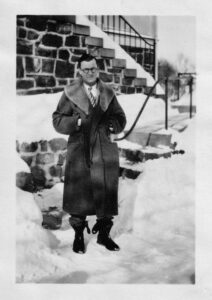If ya run outta Pharaohs, take a teaspoon of commoner and call me in the morning
For as long as I can remember, I’ve been a word maven, which I got from my mother, a word maven of the first water.
For example, instead of playing patty cake, we played word games of all sorts. The earliest one took place before my tender psyche got hijacked and crushed by the American education system. It was “aniacs.” That is, she would say, “What do they call someone who ____” — and then would fill in the blank — “loves fires,” “loves power,” “loves to steal,” and so on. And FYI, we also did phobics.
Given such an early start, and under parental encouragement, I soon branched out on my own in The Vale of Verbiage. By my preteens, I’d become fascinated by word and phrase origins, but it was a constant, uphill battle for several reasons.
First, in the Stone Age of Information Access, the only way to look up anything was in print, and the only places in My Home Town to find them was either the town or school library, both of whose holdings were, to be charitable, sparse. In fact, the only two sources were the Encyclopedia Britannica and the Webster’s (the Third World wasn’t published ’til I was 14), so even though they contained a lot of information, when it came to etymologies, they were both sorely lacking.
My second source of word origins was serendipity: If I happened to run across one in “Ripley’s Believe It or Not” or a magazine or newspaper blurb.
My last source was directly from people. The problem I had with them is the same one now: Mostly, they’d learned the origin from someone else, who in turn had learned it from another person — all of whom were wrong. But because they’d been wrong for so long, they had tradition on their side. In short, after a few generations, total bumpf turns into undying truth. And woe betide the fool brazen enough to question such eternal verities.
“Whattay mean ‘mind your P’s and Q’s’ doesn’t refer to pints and quarts?” says some believer. “My uncle Buck told me it did. And he should know!”
“Yeah, he should,” I say. “But he doesn’t.”
“Oh?” he says, bristling. “And you do?”
“Actually, I don’t,” I say.
“Then how can you say HE doesn’t?”
“Cuz no one does,” I say.
Of course I’m just telling him the simple truth. “Minding your P’s and Q’s” is an example of the etymologist’s worst nightmare — a phrase that according to every reputable source is labeled, “Origin unknown.”
Yeah, it COULD’VE come from pints and quarts … but it just as likely came from somewhere else. We know it was first seen in print in 1602 in a play with the simple title, “Satiromastix or The Untrussing of the Humorous Poet” written by some cat named Thomas Dekker, but whence it came before that, we’ve no clue. P’s and Q’s, RIP.
My latest tracking on the Etymology Trail started with a convo with Doc McHugh, when somehow in course of our verbal perambulations, the topic of patent medicines came up.
Essentially, in the Good Old Days, when diseases and debilities were both rampant and incurable, patent medicines were the Mayo Clinic of their day. They had nothing to do with cures — no matter how much they were hyped as such — but their highest priority was reducing pain. While they may have claimed to have all sorts of exotic ingredients, their real “secret” ingredients were either alcohol or opiates. Lydia Pinkham’s Vegetable Compound, for example, contained black cohosh, life root, unicorn root, pleurisy root, fenugreek seed … and a whopping 18% alcohol. It was touted as a cure for many, as they delicately stated, “female complaints,” and probably gettin’ Granny buzzed helped at least a little.
But some of the patent medicines were complete hypes, and foremost among them was mummy powder.
–
Mum’s the word
–
What the hey was mummy powder?
It was just that — ground up desiccated ancient Egyptians. And if no Pharaonic-Era stiffs could be found, then a recent Egyptian (or recent ANYONE) would suffice.
It started in the early 1800s, when the Brits stomped Napoleon’s tuchis and thwarted his colonial ambitions in Egypt, so they could fulfill THEIR colonial ambitions in Egypt. In addition to “owning” all the treasures of the ancient Egyptian kingdoms, a huge source of cheap labor and unimaginable tons of sand, they inherited more mummies than Thutmose III could shake a scepter at.
See, there were mummies … and there were MUMMIES. When we hear the word, we think of all the royalty and their exotic embalmings. But they were only one tiny slice of mummydom. Tens of thousands of po’ folk were also mummified, but in a po’ folk way. That is, they got wrapped in shmatas and tossed in the back 40 (or given Egypt’s deserts, the back four million), the heat and dryness did their thing, and — Voila — a DIY mummy on demand!
So by the time of the English takeover, there were mummies galore strewn all over the sands. Though no one knows the exact count, estimates run around 70,000 for people, and in the millions for cats (but don’t let Muffy and Mittens ever know that). As well as a reincarnationist’s dream come true, once mummy powder became a patent medicine, it was an entrepreneur’s too.
But who ever thunked up the idea that pulverized mummies could cure anything in the first place?
Well, it was due to an etymological misunderstanding — coupled with plain old fashioned greed and gullibility. The word “mummy” comes from a Persian word, “mum,” which means “wac” and which is related to the Arabic word “mumiyah.” Mumiyah meant bitumen, which was some sticky black stuff they used in embalming. It was also believed by the Persians to have medicinal properties. It didn’t, but like all sorts of other falsehoods and fabrications, plenty of people swore by it.
And now the plot thickens.
While the original mummies may have been loaded with bitumen, and thus were the Persian equivalent of Big Pharma, all the dehydrated desert shlemiels contained nary a lick of it. But they had some kind of magic medical mojo that was believed by generations of believers, due solely to their name and the confusion that they contained some good ole mum.
People got hip to mummy powder being good for nothing other than filling con men’s coffers, but it took ’em long enough. It was being sold into the 20th century, and was available in pharmacies into the 1920s. In fact, Merck, the German pharmaceutical company, had it in their catalog until 1924. And even weirder, the last recorded sale was in a New York City occult shop in 1973.
Yup, you read that right — 1973.
If there’s a lesson to be learned from mummy powder, it’s this: People will gladly swallow all kinds of crap — literal and figurative.
Ultimately, mummy powder is just one more example of the crap, literally and figuratively, that people gladly swallow.


